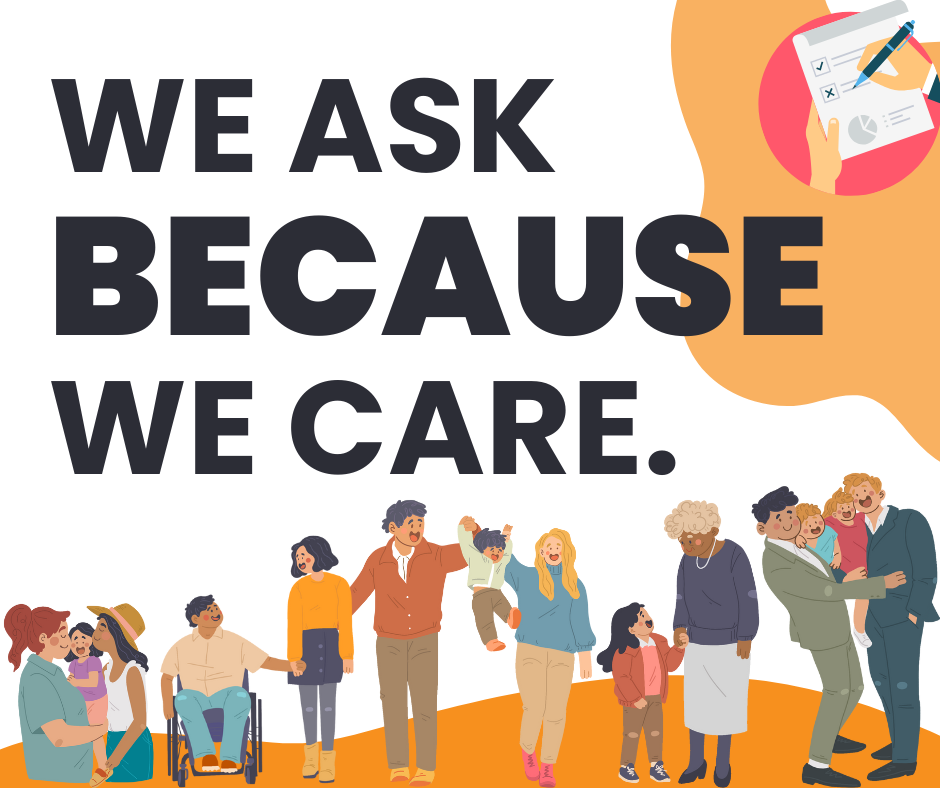
The West Nipissing Community Health Centre (WNCHC) is updating and/or collecting information to help us better understand the clients that we serve. We are embarking on this journey to improve our socio-demographic data collection to help us better plan programs and services that meet the needs and improve overall health outcomes of our client population and community.
Clients who have a health care provider at the Centre will be asked to update their client profile by completing a short survey every three years. The survey includes questions regarding demographics. The survey could be a paper copy, or you may receive the survey by email titled: We Ask Because We Care.
The information we are collecting includes:
- Language
- Racial/Ethnic Background
- Disability
- Sexual Orientation
- Gender
- Income
- Length of Time in Canada
How we will use this information:
- We will study whether factors such as language, disability, gender and so on are linked to health outcomes.
- We want to learn more about the link between how long you have been in Canada and health outcomes.
- We will review and use information to develop programs and do service training with staff.
- Your health care provider may refer you to services, give you information, or identify any unique needs, such as:
- Interpretation services
- Health information
- Treatment programs
- Accommodations for disabilities
- Care information
Frequently Asked Questions (FAQs)
“Demographic” means information collected about a group of people that helps to describe them.
By asking these questions, we will continue to know our patients and clients and become better at providing care and services. Also, sometimes people experience discrimination in health-care settings. We want to make sure that is not happening. If it is, we want to correct that.
Yes, the Ontario Human Rights Commission strongly encourages organizations to collect and use demographic information to keep track of outcomes and promote equity. Also, Ontario’s Excellent Care for All Act, 2010 is a law that holds hospitals responsible for delivering quality health care. This law has health-care organizations collect information from patients and clients about their experience. We learned that demographic information impacts patient and client experiences and decisions about whether to use health care or not.
We take your privacy very seriously.
- This information will be visible only to your healthcare team and protected like all your other health information.
- This information will remain confidential and will not be visible to anyone.
If used in research, the information from all patients and clients will be combined, and researchers will not be able to identify who they are.
It is important for us to know who we serve, whether the patient and client needs match the care we provide for all.
This information will help us understand and plan care not only for your future visits, but for other patients and clients who may have similar needs to yours. This gives us a full picture of our patient and client population.
You can answer “prefer not to answer” to any or all questions. This will not impact the care you receive here.
Disability covers a broad range and degrees of conditions. Some are visible and some not visible. A disability may have been present from birth, caused by an accident or developed over time. There are physical, mental, learning disabilities, mental disorders, hearing and vision disabilities, drug and alcohol dependencies and other conditions that constitute as a disability. Disability is often described as the social oppression faced by people with impairments living in an environment that is not organized to accommodate their needs. While many people with disabilities are in good health, the vast majority face barriers in utilizing the health care system for various reasons. That said, we want to
ensure we are accommodating everyone we serve. Here are some examples below:
- Chronic illness (e.g., Chronic Obstructive Pulmonary Disease, Asthma, Diabetes)
- Developmental disability (e.g., Attention-Deficit/Hyperactivity Disorder, Autism, learning disorders)
- Mental illness (e.g., Depression, Anxiety)
- Physical disability (e.g., Amputation, Cerebral Palsy, Fibromyalgia, Arthritis, Multiple Sclerosis)
- Sensory disability (e.g., Autism, loss of hearing, sensory processing disorder)



